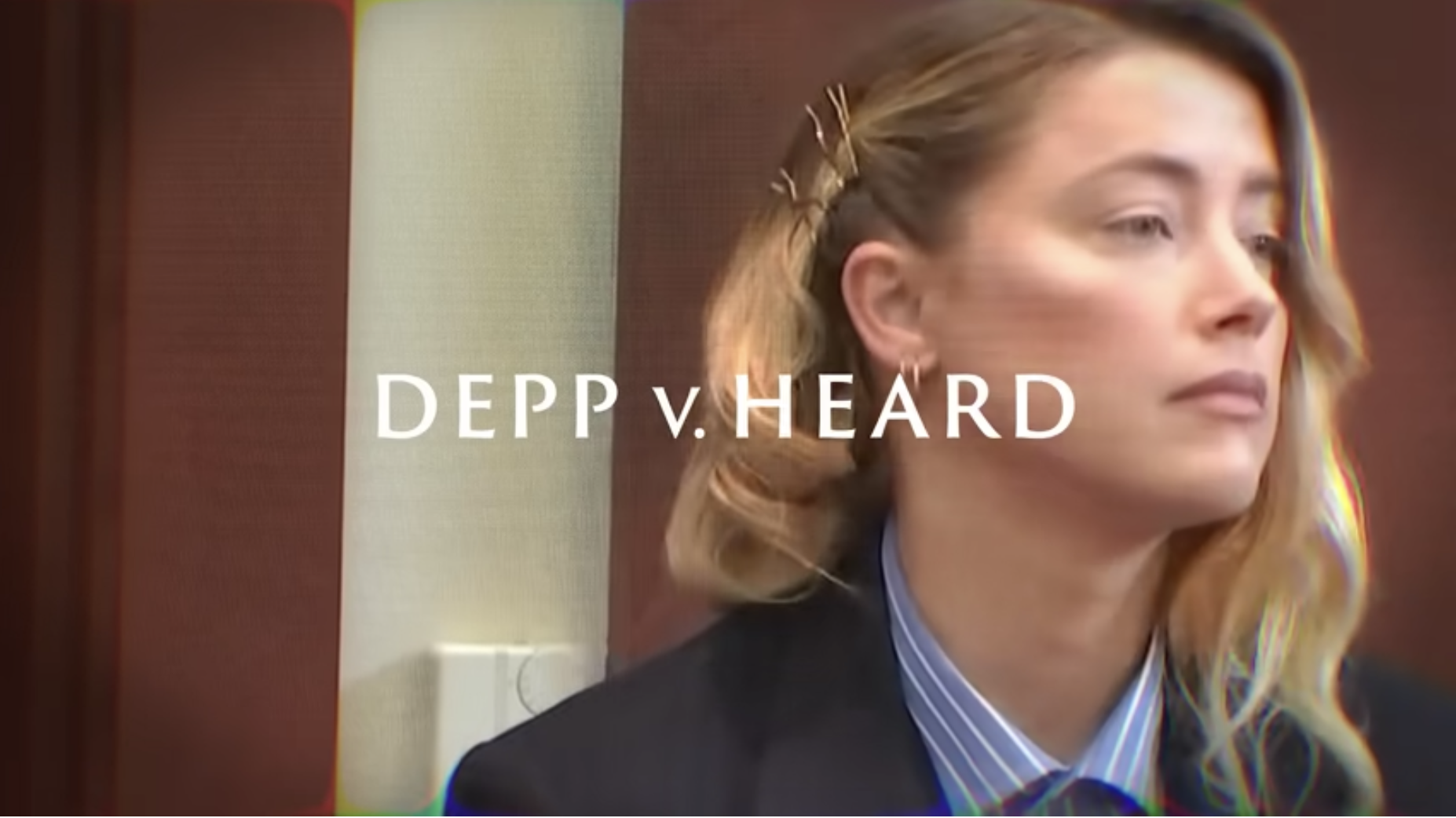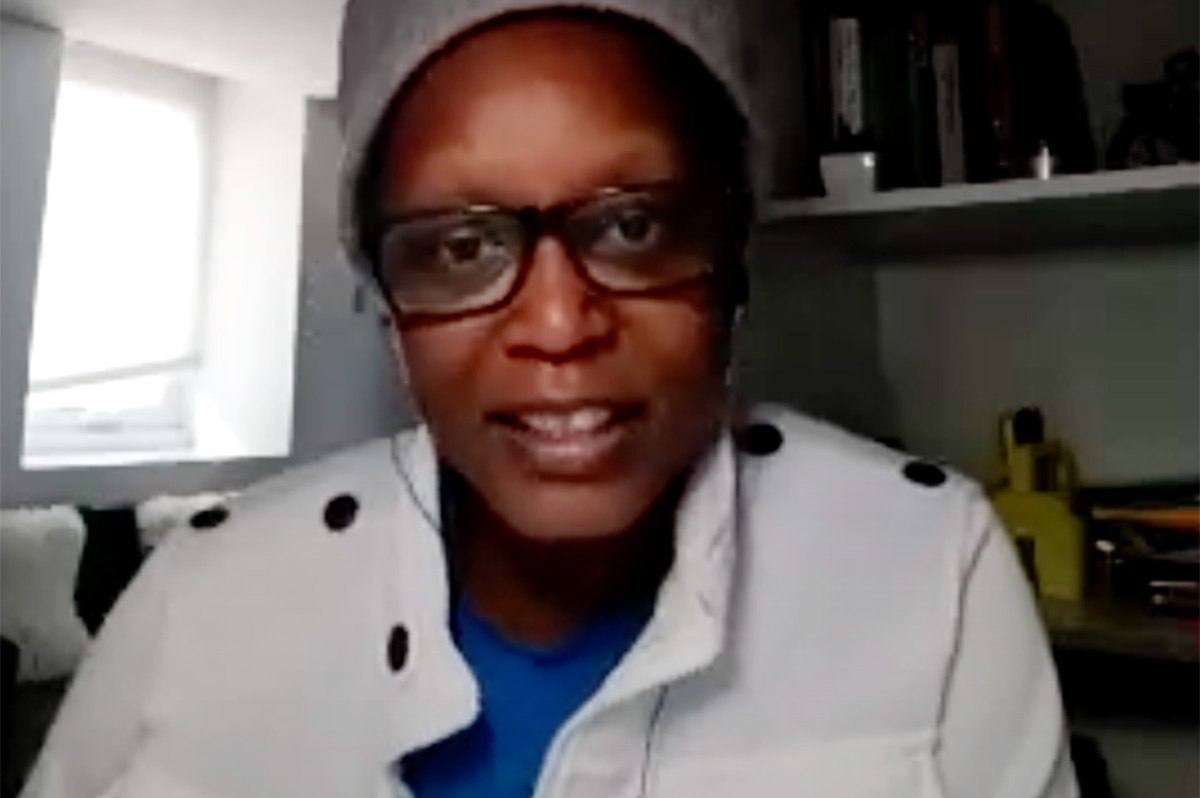Opinions
Johnny Depp, Amber Heard and the deeply unsatisfying matter of re-litigating their trial
The series was panned by critics

On Aug. 16, Netflix released a three-part docuseries revisiting last summer’s televised civil litigation over allegations that Amber Heard had defamed ex-husband Johnny Depp by claiming to have survived sexual violence and domestic abuse during their four-year relationship.
Rather than offering anything new by way of insight or analysis from anyone with relevant qualifications or experience, each episode features clips from some of the online “creators” who turned their hot takes on the trial into a veritable cottage industry of amateur legal commentary and courtroom conspiracy theories, feeding the rapacious demand for anti-Heard and pro-Depp content. (As if to underscore the project’s unseriousness, these included a men’s rights YouTuber who wore a Deadpool mask and was surrounded by Spider-Man costumes.)
Worse still, “Depp v. Heard” director Emma Cooper fails not only to answer but also to even ask the obvious questions that have lingered since a verdict was returned more than 14 months ago by seven jurors in northern Virginia who were not sequestered as the case became, by far, the most popular topic on social media and online platforms.
At the same time, however, the episodes include footage of courtroom testimony that offer a glimpse, though incomplete, into some of the trial’s more salient and dispositive moments that I otherwise would never have seen (with neither the time nor the inclination, either last year or now, to follow 120+ hours of argument by the parties presented over the course of a seven-week trial.)
Do these scenes redeem the series? Hardly. But that does not mean they offer nothing of value, especially considering that while this was not the retelling of last summer’s events that we deserve, it remains the only one we’ve got. At least, for now.
Susan Sontag, in her 1977 collection of essays “On Photography,” proclaimed “The camera makes everyone a tourist in other people’s reality, and eventually in one’s own.”
In “Depp v. Heard,” the cameras facilitate a very specific kind of tourism that feels both exploitative and voyeuristic, because the reality in which we find ourselves trespassing is dark: the unraveling of a relationship between movie stars through patterns of dysfunction and abuse both familiar and alien, knowable and unknowable, like a city you have visited but never called home.
Especially when coupled with the more outrageous moments from trial that made headlines at the time – such as the debate over whether Heard defecated on Depp’s bed and blamed his teacup Yorkshire Terrier – there is a temptation to treat footage of testimony concerning the smashing of liquor bottles and hurling of wine glasses, the shoving and taunting and threats, even the physical and sexual violence, as though it were pure spectacle.
However, this would suggest, wrongly, that the painful realities of the actors’ relationship are so far removed from our lived experiences that we do not, cannot, or should not relate to them. As if a seven-week trial adjudicating the conflicts in our own intimate relationships or those involving the people we love would not turn up evidence of trouble and dysfunction, or worse.
Considering that we are primed to pick winners and losers and heroes and villains, perhaps it was unsurprising that incomplete and selectively edited footage from the case provided ample fodder for Instagram reels and TikTok videos that were created in the service of narratives that, most often, favored Depp and vilified Heard.
For me, witnessing these scenes in their proper context revealed a picture so much more complicated and, frankly, ugly that the prospect of framing the case in this manner seemed as preposterous as the idea that audiences leaving a production of “Who’s Afraid of Virginia Woolf” should find themselves allied with either Martha or George.
To take just one example: From the witness stand, Heard recounted how she would often return home to their shared Los Angeles penthouse to find Depp nodding off in a chair because he had washed Roxicodone down with whiskey, or lying supine on the sofa fully unconscious with melted ice cream pooled in his lap. Worried about her husband’s apparent substance use disorder and unsure how best to help, the actress admitted she would sometimes take photos of him and share the pictures with a trusted friend.
Or, Depp’s attorney asked, was she just trying to humiliate him? Or, online commentators asked (often rhetorically), was this a calculated and premeditated move to collect evidence she would use against Depp in litigation or for purposes of extorting him?
As if these motives are mutually exclusive.
Having experienced the pain of watching loved ones spiraling in the throes of drug and alcohol addiction, I can tell you why I suspect Heard took the photos, but of course the reality is neither I nor anyone else – perhaps not even she – has any clue.
Last year, so much of the online noise about the trial came from content creators who made specious arguments to poke holes in the credibility of Heard’s testimony or alleged ulterior, sinister hidden motives based on the actress’s countenance, demeanor, speech, and other behavior.
For example, in clips that were often selectively edited or presented outside of their proper context, Heard might have seemed to cry more hysterically upon realizing the cameras were trained on her, which were used as supposed proof that her claims of suffering abuse at the hands of her ex-husband must therefore be fabricated.
Watching the footage in the manner presented on screen in “Depp v. Heard,” it becomes even more obvious how silly these interpretations were. In reality, of course, no one – not even police officers, trial court judges, F.B.I. and C.I.A. agents, trial lawyers or forensic psychiatrists – can reliably spot when someone is lying to them.
However convincing some YouTuber may have been, and however comforting the idea that we are able to see through the lies of others, I’m sorry to tell you the research on this is overwhelming and uncontested.
As Malcolm Gladwell observes in “Talking to Strangers,” Amanda Knox was falsely convicted for a murder she did not commit because “much of the prosecution’s case…rested on the allegedly strange, guilty behavior she exhibited,” which “the public deemed not in line with typical responses to grief and trauma.”
The cameras did not tell the complete story.
Well before 2022, private details about Depp and Heard’s troubled relationship had spilled onto the pages of tabloids like The Sun, which called Depp a “wife beater” in a 2018 story alleging that “overwhelming evidence was filed to show Johnny Depp engaged in domestic violence against his wife.” After he sued the paper for defamation, London’s High Court of Justice ruled against the actor in 2020, concluding the claims at issue were “substantially true.”
Still, last summer’s litigation between the actors earned far more public attention and unearthed far more (and far more titillating) private information, causing, therefore, far more damage than the supermarket rags and gossip blogs – as well as, ironically, the financial and reputational damage resulting from the very defamation claims that were adjudicated at trial.
As a reminder, Depp sued his ex-wife for a 2018 opinion article in the Washington Post in which she had written, “two years ago, I became a public figure representing domestic abuse, and I felt the full force of our culture’s wrath for women who speak out.” Heard was referencing the backlash against, essentially, identical claims she made in a statement after securing a restraining order against Depp following their divorce in 2016. (“During the entirety of our relationship, Johnny has been verbally and physically abusive to me,” she wrote.)
In so many cases including this one, intimate partner abuse is messy. An audio recording of one of the couple’s arguments shows Heard acknowledging she had struck her ex-husband but denying that she punched him. Her testimony, meanwhile, detailed serious violent crimes, including that Depp had thrown her into a ping pong table and repeatedly hit her in the face before sexually assaulting her with a liquor bottle that may have been broken.
Of course, assuming their sworn testimony to be true, it must also be said, domestic violence is a gendered crime. And the imbalanced power dynamics within their relationship put Heard at a disadvantage, including in this respect. While both are famous actors, the wealth, power, and fame wielded by Depp was then (and remains, now) much greater.
The disparity was evident from the outset. In the Netflix series, throngs of fans are shown cheering the Pirates of the Caribbean star and booing Heard on the first day they were sighted arriving separately to the Fairfax County Circuit Court. Meanwhile, online, evidence of a sustained and coordinated character assassination of Heard had just begun to emerge.
The smear campaign would persist through the trial and beyond. The actress was called a manipulative liar, a gold digger, an abuser, a violent psychopath, a drug addict, and worse. Some of the most outrageous claims were among the most widely circulated: She snorted cocaine on the witness stand, killed her own mother to conceal testimony that would have exonerated Depp, plagiarized lines from the film The Talented Mr. Ripley.
Creators mocked Heard by lip-synching over audio of her testimony about suffering violent abuse in videos that went viral on TikTok along with hashtags like #JusticeForJohnnyDepp, which was seen nearly 3 billion times on the platform. (#justiceforamberheard earned just 25 million views.) One-sided articles and videos, many containing false and misleading claims, were promoted by Ben Shapiro’s conservative media outlet The Daily Wire through its estimated $35,000 and $47,000 purchase of Facebook and Instagram ads.
“Depp v. Heard” was panned by critics.
“If ever a true-crime documentary needed the usual collection of talking-head interviews with esteemed journalists, law enforcement veterans and legal experts to put things in perspective,” Richard Roeper of the Chicago Sun Times wrote, “this is it — but that never happens.”
Others, like CNN’s Brian Lowry, agreed: “How much is gained from listening to a guy in a Deadpool mask offering extensive trial takes is a question ‘Depp v. Heard’ should have contemplated and apparently didn’t,” he wrote.
Several reviews added that part of the problem was that not nearly enough time had elapsed between the events and their retelling. Bustle’s Scaachi Koul pointed to other recent projects involving the private lives of public figures (especially women) that, with sufficient space and distance, found new and interesting things to say about their subjects and opportunities to tell their stories anew.
Ryan White’s excellent documentary “Pamela: A Love Story,” which was released by Netflix in January, manages to find plenty of material about actress and model Pamela Anderson along with the broader sociocultural forces of the 90s and early aughts that helped shape – and were shaped by – the era’s most enduring sex symbol.
The film would have been nothing, however, without Anderson. Listening to her tell her own story, one realizes how poorly suited everyone else was to the task – particularly the leering talk show hosts and journalists who treated her as nothing more than a sex object.
And maybe that, above all else, is the lesson to be gleaned from “Depp v. Heard”: Let’s come back to this story, sure, when we’re ready to cut through the bullshit, reframe the conversation away from the “him vs. her” framing, stop relying on provably unreliable evidence, and consider the broader context of their relationship and the impact of the trial that happened on TikTok and YouTube. And let’s definitely listen to Heard if and when she’s ready to talk about this again.
Until we get that docuseries (or documentary, scripted series, film, book, whatever), I fear everything else will be deeply unsatisfactory and unsatisfying.
Opinions
Science must not be a weapon against trans people
HHS directive would fund studies on ‘detransition’ among children

A concerning research directive is quietly circulating through the U.S. Department of Health and Human Services. The directive, issued in response to presidential Executive Order 14187, calls for the National Institutes of Health to fund studies focused on “regret” and “detransition” among children who have accessed gender-affirming care. It explicitly demands that researchers avoid “subsidizing or incentivizing” such care – language that is both vague and deeply ideological.
President Trump’s executive order, titled “Protecting Children from Chemical and Surgical Mutilation,” was signed in January 2025 and frames all gender-affirming care for minors as inherently dangerous. It calls for an investigation into the “long-term side effects” of such care and restricts federal funding to any institution providing it. In effect, it lays the groundwork for a federally sanctioned research agenda that aims not to understand transgender health but to discredit it.
Behind the recent HHS memo lies a dangerous truth: The federal government is attempting to repurpose science as a tool for political ideology. If this directive proceeds, it will not only erode the credibility of public health research, but it will also put transgender lives at risk.
This warning is not hyperbole. The memo uses inflammatory language like “chemical and surgical mutilation” to describe standard gender-affirming treatments such as hormone therapy and surgery. These terms are not neutral. They are the rhetorical weapons of anti-trans movements, now embedded in federal policy language. Their use signals a chilling shift: science is no longer being asked to explore, understand, or improve lives. It is being asked to justify harm.
Let’s be clear: Regret following gender-affirming care is exceedingly rare. Evidence suggests that the regret rate among individuals who have had gender-affirming surgery is less than 1%, compared to a surgical regret prevalence of about 14% among the general population. Moreover, studies have found that when transgender people report regret following gender-affirming surgery, it is often related to external factors like lack of support from family and peers.
The evidence is consistent and overwhelming: gender-affirming care, including gender-affirming surgery, improves mental health, reduces suicidality, decreases substance use, and affirms a person’s identity and autonomy. That’s why the American Medical Association, the American Academy of Pediatrics, the American Psychiatric Association, and every major medical organization in the United States recognize the safety, efficacy, and medical necessity of gender-affirming care when provided in accordance with established guidelines.
And yet, this new directive demands the opposite. It explicitly instructs researchers to avoid using methods that “subsidize” or “incentivize” transition – a vague prohibition that could limit recruitment, constrain study design, and exclude institutions that provide care. It also bars federal funding to any site offering gender-affirming care to minors, ensuring that the very institutions with the clinical expertise and trust of transgender communities are excluded from the research altogether.
This is not how science works. It is how propaganda works.
There is no scientific integrity in a process that defines its conclusions in advance. There is no public benefit in research that singles out one of the most vulnerable populations – transgender youth – as the sole subject of scrutiny while erasing their overwhelmingly positive outcomes. There is no ethical justification for using federal funds to stigmatize identities and restrict medical freedom.
All aspects of transgender health – positive, negative, and complex – deserve rigorous scientific study. That is what good research does. It seeks truth through comprehensive, community-engaged inquiry. But this directive does not aim for understanding; it fixates exclusively on harm. By selectively funding studies on regret and detransition and explicitly discouraging research that might affirm or support transition, it transforms science from a tool of discovery into an instrument of ideological control.
The consequences of this directive are real. It will erode trust in health research, particularly among transgender people who already face systemic discrimination in medicine. It will chill academic inquiry, pushing researchers away from transgender health for fear of political reprisal. And it will feed a wave of state-level legislation banning gender-affirming care – legislation that increasingly cites distorted or misrepresented science as justification.
This directive is not just an attack on trans rights. It is an attack on science itself.
We must respond with urgency.
First, institutions that receive NIH funding must speak out. Silence enables political interference to become normalized. Deans, department chairs, and ethics boards must draw a clear line: public health research cannot be allowed to serve discriminatory ends.
Second, scientific societies and journals must reaffirm their commitment to ethical, community-engaged, and evidence-based research on transgender health. This means actively promoting rigorous work that reflects the full complexity of transgender people’s lives. Not just those experiences that fit a political narrative.
Third, Congress must exercise its oversight powers. Lawmakers should demand transparency around how and why this directive was issued and ensure that federally funded research respects both scientific standards and human rights.
And finally, the research community must organize. Transgender health researchers, bioethicists, and community partners need to work together to defend the autonomy of science and the dignity of research participants. This is not a moment for neutrality. It is a moment for moral clarity.
We are living through a time when transgender people are being targeted by laws, banned from public life, and erased from textbooks. Now, the very tools of science are being turned against them. If we don’t stop this weaponization now, the damage won’t just fall on transgender communities; it will fall on all of us who believe in evidence, equity, and truth.
Harry Barbee, Ph.D., is an assistant professor at the Johns Hopkins Bloomberg School of Public Health. Their work focuses on LGBTQ+ health equity and public policy.
Opinions
D.C. leaders must show up for LGBTQ+ communities
Silence is not an option amid relentless attacks

At a time when D.C. and the LGBTQ+ community are under relentless attack, we cannot afford silence — or inaction. The DC LGBTQ+ Budget Coalition, a grassroots alliance of more than 20 LGBTQ-led and LGBTQ-serving organizations and individuals, is calling on Mayor Bowser, the D.C. Council, and every level of D.C. government to act with urgency and purpose in this year’s budget process to invest in our community. Our lives, our futures, and our rights are on the line — not just nationally, but here at home in the District. How D.C. as a city responds in the face of hate sends a powerful message to the rest of the country.
We formed this coalition because LGBTQ+ people in the District — especially Black, Brown, trans, disabled, and low-income residents — deserve more than token inclusion. We deserve policies, investments, and leadership that center our lived realities and deliver on equity. While Congress tries to strip D.C. of home rule and holds our budget hostage, our local government has the power — and responsibility — to lead.
We are not a performative alliance. We are a community-driven movement. From housing to healthcare to workforce development, we believe budgets are moral documents — and D.C.’s budget must reflect the values of equity, justice, and liberation.
National Context Demands Local Action
Just this year, members of Congress introduced damaging legislation to reverse D.C.’s home rule, stripping District residents of the fundamental rights of self-governance enjoyed by their own constituents. Additionally, the White House seeks to rule over us by executive order, issuing edicts to overturn our laws. Adding further insult to injury, extremists in the House of Representatives are holding $1.1 billion of D.C.’s own tax revenue hostage to their radical anti-democratic agenda.
Moreover, this administration continues its assault on diversity, equity, and inclusion initiatives, undermining civil rights protections across the country. We are not simply witnessing bureaucratic shifts; we are standing at the edge of a cliff, staring down a coordinated rollback of the very protections our communities have bled to secure.
Veterans of past queer liberation fights remind us that we’ve been here before. From the Lavender Scare to Stonewall to ACT UP, from the fight for marriage equality to the ongoing battle for trans rights, queer warriors have long known what it means to survive government neglect, societal backlash, and moral panic. Their testimonies warn us: This moment is severe. This moment is familiar. And this moment requires us to act.
These are not theoretical attacks. They are strategic, structural, and escalating. In this context, D.C. must serve as a model for sanctuary, resilience, and resistance. That means investing in communities — not abandoning them.
We know that our local leadership has, at times, moved preemptively to comply with federal executive orders — even when those directives run counter to our values. And while the mayor has publicly affirmed equity, housing, and inclusivity as core priorities, this moment demands more than words. We call on the mayor and District leaders to stand firm in those stated commitments and meet this moment with the clarity in the District’s budget. D.C. must not be a conduit for federal overreach, but a bulwark against it.
Our FY26 Priorities
In this year’s budget, we’re calling for the D.C. government to protect targeted investments in:
• Public Health: Restore and expand local funding to fill the dangerous gaps left by federal cuts to HIV prevention and mental health services. Ensure culturally competent care for LGBTQ+ residents, especially those with disabilities and chronic health conditions.
• Employment and Economic Equity: Sustain and grow workforce development programs for trans and gender-diverse (TGD) residents. Expand partnerships with employers and support entrepreneurial training by and for the TGD community.
• Housing: Invest in long-term housing solutions, including for LGBTQ+ youth and seniors, and protect programs like Emergency Rental Assistance Program (ERAP) and Tenant Opportunity to Purchase Act (TOPA) that keep people residents housed.
• Safety and Community Support: Fund LGBTQ+ survivor shelters and IPV/SA services, ensure disability and language access, and streamline government grant processes for community-based organizations.
We’ve outlined these and other priorities in our full FY26 Budget and Policy Platform, recently delivered to the Mayor and D.C. Council. But we know that a letter alone isn’t enough—we must take action.
We’re Organizing — and We’re Not Alone
In this past week, we launched a letter-writing campaign to mobilize D.C. residents to urge their Council members to prioritize LGBTQ+ budget needs. We are also releasing a citywide sign-on letter for partner coalitions and ally organizations to demand the same.
Our members are showing up at budget hearings, meeting with agencies, and organizing communities across all eight wards. And while we’re proud of the momentum, we need our community to join us. We need every resident, organization, and elected leader to get in this fight.
How You Can Get Involved
Here’s how you can join the movement:
• Individuals: Sign our Action Network letter to Council members and the Mayor.
• Testify or submit written testimony at budget hearings to uplift our priorities.
• Call and email your Council members — demand full inclusion of LGBTQ+ needs in the FY26 budget.
Together, we can ensure that D.C.’s budget reflects the lived realities and urgent needs of LGBTQ+ communities across all eight wards.
The question before D.C.’s leaders is clear: Will you choose to look the other way or will you join us in taking action?
Heidi Ellis is coordinator of the DC LGBTQ+ Budget Coalition. Erin Whelan is executive director of SMYAL (coalition member).
Opinions
LGBTQ elder voices matter now more than ever
Global Story Archive highlights often ignored perspectives

Kasha Nabagesera is widely regarded as the Mother of the Ugandan LGBTQ+ human rights movement. As one of the most prominent human rights activists of our time, she is no stranger to speaking publicly about her life. However, when I had the privilege of sitting down with her this February, she opened up about a part of her story that is often overlooked—or, even worse, ridiculed. Aging.
When Kasha turned 40, she began to notice a shift in how people viewed and spoke about her lived experience. In the years since, she has received hurtful and dismissive messages from younger LGBTQ+ people who believe her age renders her opinions and perspective irrelevant. These individuals fail to recognize that the sacrifices made by Kasha and other elders have paved the way for today’s young queer people to live their lives openly and proudly.
Disregard for LGBTQ+ elders is not just disrespectful—it’s a missed opportunity for connection at a time when solidarity among LGBTQ+ people is desperately needed. The number of anti-LGBTQ+ bills continues to rise in state legislatures across the U.S., and about one-third of the world’s countries, including 60 UN member states, still criminalize consensual same-sex sexual acts.
The reality is that our elders are true pioneers of the LGBTQ+ movement worldwide. They have survived decades of discrimination and state-sanctioned violence, leading them to face many unique challenges.
Many report having to “go back into the closet” to access care in later years, lack family support networks, and discrimination in housing and healthcare. LGBTQ+ older adults are also less likely to have retirement savings due to decades of employment discrimination.
Through these struggles, LGBTQ+ elders have developed remarkable wisdom, and their lived experiences can provide a roadmap for resilience in the face of new obstacles. But too often, we fail to listen to them, and their contributors are forgotten.
Over the last three and a half years as director of International Programs at SAGE, I have spoken with hundreds of elders worldwide about their lives and legacies. Most have shared similar experiences of ageism and a desire to pass on their knowledge to younger generations.
One of those elders is Reingard Wagnar, a 74-year-old lesbian and activist from Germany. She said that not only are older women in society rendered invisible anyway, but it is especially true for older lesbians. She wants people to know that elder LGBTQ+ folks are here, and they have much to share.
Another elder I had the honor of meeting, Kevin Mchawiro, is a Kenyan journalist and believes stories can also serve as a source of inspiration and that love does indeed win.
To collect, preserve, share and amplify the stories of elders like Kasha, Reingard, and Kevin, I created The Global Story Archive. Supported by SAGE and in collaboration with a global network of not-for-profit organizations and independent activists, this first-of-its-kind collection features the voices of dozens of LGBTQ+ elders who are eager to share their perspectives across generations and borders.
However, in the wake of Trump’s Executive Orders on Foreign Aid, the uncertainty of where funding and support lies, and what the future looks like, SAGE must close its global operations. This suspension is happening in tandem with the dismantling of foreign aid programs that advance the well-being of other underserved populations, including immigrants, women, and those burdened by disease.
The loss extends beyond funding cuts or policy shifts; it represents the erosion of programs that have fostered solidarity and advanced the well-being of us all.
If you find yourself asking how to find resilience in this turmoil, the answer is simple: look to our elders. Our international community of LGBTQ+ elders has lived through and witnessed moments of upheaval, tragedy, and triumph, and they hold priceless knowledge to counsel younger generations through hardship.
The state of the world is uncertain, but as elders will tell you, it can get better.
To hear and learn from the voices of our global community of LGBTQ+ elders, please visit The Global Story Archive.
Hannah Yore is an international health and human rights advocate with expertise in aging, care work, and LGBTIQ human rights. She is the former director of International Programs at SAGE and is a dedicated palliative care and end-of-life doula.
-

 Opinions5 days ago
Opinions5 days agoIt’s time for new leadership on the Maryland LGBTQIA+ Commission
-

 The White House5 days ago
The White House5 days agoWhite House does not ‘respond’ to reporters’ requests with pronouns included
-

 Arts & Entertainment5 days ago
Arts & Entertainment5 days ago‘Gay is Good’ Pride Pils Can Celebrates Frank Kameny’s 100th Birthday for WorldPride in D.C.
-

 Sponsored5 days ago
Sponsored5 days agoTHC Drinks: What You Should Know About Cannabis Beverages












